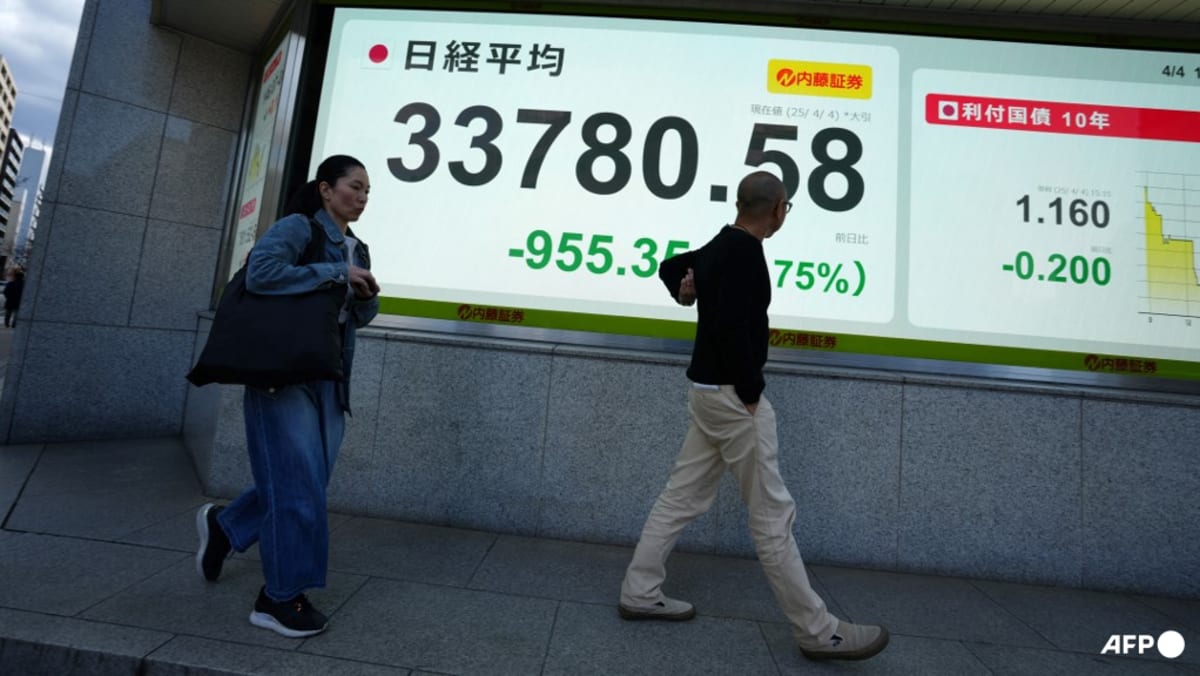LONDON: Equities and oil prices extended a global rout for markets on Friday (Apr 4) after China hit back over President Donald Trump’s tariff blitz with its own mammoth levy on United States goods, inflaming global trade war fears.
Despite the market turmoil, Trump insisted: “My policies will never change.”
Wall Street stocks fell more than two per cent at the start of trading, with the blue-chip Dow falling below 40,000 points for the first time since last August, a day after the S&P 500 experienced its largest drop since the COVID-19 pandemic in 2020.
The tech-heavy Nasdaq, meanwhile, was on course to confirm a bear market, having dropped more than 20 per cent from its all-time closing high touched in December.
“Sentiment is so fragile right now,” Chris Beauchamp, chief market analyst at online trading platform IG, told AFP.
“Investors are firmly in the ‘get me to cash now’ phase, on fears that other nations will follow China’s lead, and of course that the US president will respond to China’s tariffs with even more charges.
“This trade war is like nothing we’ve seen for years, perhaps decades,” Beauchamp added.
The S&P 500 lost 134.05 points, or 2.48 per cent, to stand at 5,262.47 points, while the Nasdaq Composite dropped 473.16 points, or 2.86 per cent, to 16,077.44. The Dow Jones Industrial Average fell 994.46 points, or 2.45 per cent, to 39,551.47.
Frankfurt’s main DAX index of German blue-chip companies plunged more than 5 per cent moments after the Chinese government said it would slap additional 34 per cent tariffs on all imports of US goods from Apr 10.
It then pared losses to stand down 3.8 per cent in afternoon deals, with Paris and London also down more than 3 per cent.
The falls came despite data showing the world’s biggest economy added 228,000 jobs last month, much higher than analysts expected.
“There’s no question that the trade war is fueling the current sell-off, but the big question is if and when it will start to impact the economy in a meaningful way,” said eToro US investment analyst Bret Kenwell.
The jobs report “again showed that we have yet to see a significant spike in jobless claims, and if the most recent payrolls report avoids a large revision lower like we saw for February, it bodes well for the US economy”, he added.
The dollar was steadier against main rivals having fallen sharply on Thursday on fears of a recession in the United States.
But oil futures plummeted around 7 per cent, having already plunged about 6 to 7 per cent on Thursday on the prospect of weaker demand.
News that OPEC+ had unexpectedly hiked crude supply more than planned added to the steep selling.
The price of traded copper – a vital component for energy storage, electric vehicles, solar panels and wind turbines – tumbled more than 5 per cent.
Beijing on Friday also imposed export controls on seven rare earth elements, its commerce ministry said, including gadolinium – commonly used in MRIs – and yttrium, utilised in consumer electronics.
“Another jolt of fear has shot through markets as China’s threat of retaliation has materialised,” said Susannah Streeter, head of money and markets at Hargreaves Lansdown.
“The big concern is that this is a sign of a sharp escalation of the tariff war which will have major implications for the global economy.”
